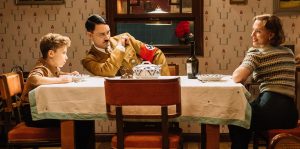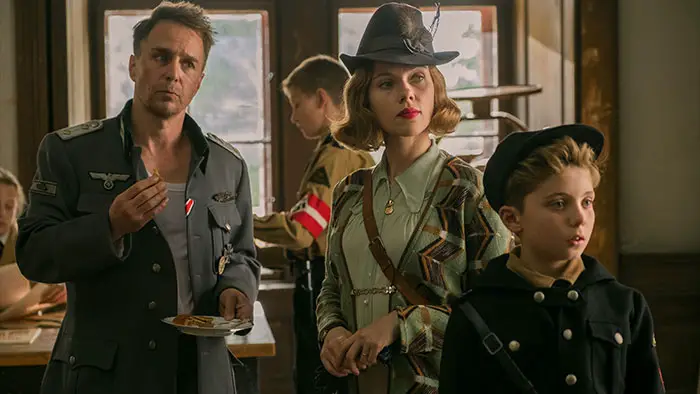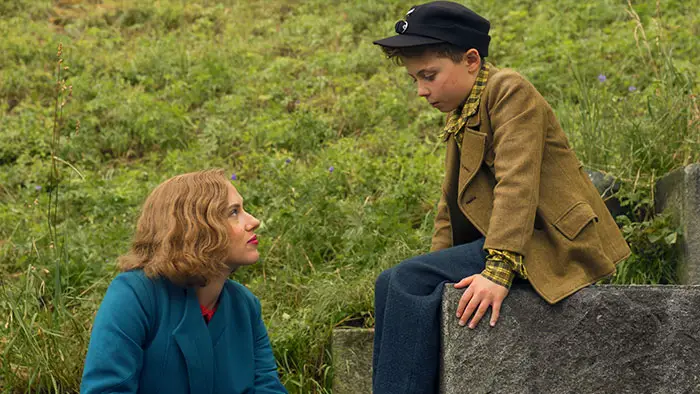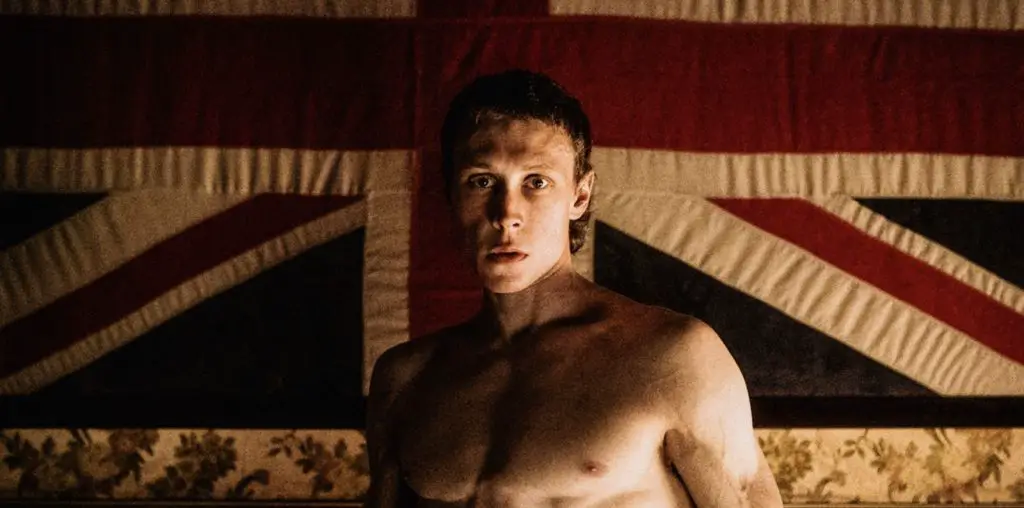
With so many new movies, why would you spend precious hours of your 2024 (which we’ve already spent half of) watching a 2019 movie? More importantly, if you’ve already watched the movie when it first came out, why would you spend time and energy rewatching it when you could watch something new instead?
Well, here are five compelling reasons why watching Jojo Rabbit in 2024 is definitely not a waste of your time.
1. An interesting take on history
Right off the bat, it’s really important to mention that the movie is set in Falkenheim, a town not far from Nurenberg, which was, more or less, the ideological capital of nazism. It’s the story of a boy in Hitlerjungend (HJ in the rest of the article), an organization made to indoctrinate German youth into being “good” nazis.
Now, from this historical perspective, it’s really easy to judge. But to someone who was nine or ten at the time, there wasn’t really that much of a choice. In the movie, they were represented as Boy Scouts with swasticas, which is really not that off, let alone for a few things. The indoctrination, warfare drills, and book-burning activities are included in the opening sequence.
Jojo is a ten-year-old boy who has a best imaginary friend, Adolf Hitler, played by director Taika Waititi himself. This is only there to show how deep the indoctrination goes. Hitler is often portrayed smoking (although an avid antismoker) and eating meat (although a vegetarian), just to show that this is not a real Hitler, but Hitler, as a ten-year-old boy from HJ, would imagine him.
It’s really not that hard to see why the movie is banned in Russia. So, if you’re from there and intend to watch it, you might want to look for one of the most secure VPNs that you can find as they allow you to change your location virtually to one of the many countries where the movie is still allowed.

2. A coming-of-age story
The movie is really not about the war. It’s a coming-of-age story about a young boy living in one of the most complex, worst times in human history. Sure, kids in other parts of Europe and the world had it worse, but this is hardly a competition.
We’re talking about a young boy with an imaginary friend, a first crush, and facing some of the challenges for the very first time. The circumstances just make these challenges a lot more serious, with consequences that are a lot more dire. If he tells his big secret, he won’t get grounded; someone will get killed. Just think about facing that kind of responsibility as a ten-year-old.
This is also a story about a boy who had to grow up overnight. Being left alone in the world and having to take on the responsibilities of an adult is never easy, but life sometimes doesn’t give you a choice. It’s wartime, and it’s 1945. There are no child protective services, no caring cousins, and even the neighbors are just minding their own business.
All that Jojo has is his limited life experience and a few pieces of sage advice he received from adults who cared enough to give him their opinions.
3. A new perspective on the German people
The movie tries to answer one of the most difficult questions of the 20/21st cinema – is it okay to make fun of Nazis, with a unique take: absurdist humor.
The best representatives of this humor are Jojo’s mother (a resistance member), Captain K (a disillusioned member of the German armed forces), and Fraulein Rahm (an over-the-top, indoctrinated nazi fanatic).
There’s a reason why the movie took this approach. You see, the real-life events that the movie depicts are really, really horrible, and portraying them as they were is too much, even for movies like Schindler’s List. Even there, they had to tone it down to make the movies watchable.
At the same time, not all of Europe was a concentration camp or the frontline. In a small town in the German heartland, the war looked a tad different until the very end. Sure, there was rationing during the later years when Wehrmacht was on the back foot, but it was still relatively normal. Kids went to school, people went to work, and everyone just looked to go by.
Some Germans, like Jojo’s mother, did help hide the Jewish population, and some German soldiers, like Captain K, did make heroic sacrifices to save others.

4. The importance of parenthood
One of the movie’s most important messages, which went over most people’s heads, is the importance of good parenthood, especially in times like those portrayed in the movie.
You see, regardless of the indoctrination of the Nazi party, in the end, the lessons of his mom managed to prevail. Throughout the movie, she ominously repeats that she’s “doing what she can” until, in the very last minutes of the movie, this becomes Jojo’s creed, as well.
This can be seen in other characters, as well. For instance, Jojo’s best friend, Yorki. It is heavily implied that his parents are decent people, which is why Yorki’s good nature and kind heart are impossible to hide. Yorki is not as zealous, and throughout most of the movie, it seems like he’s immune to the most extreme of the nazi rhetoric.
Now, add to the list the fact that these are the times when even the parents who were anti-nazi couldn’t say so openly in front of their kids. One comment by their kid in school could be enough to get them killed, which is why they had to approach this topic as subtly as possible.
The biggest tragedy (heavy spoilers ahead) is that Jojo’s mother never lived to see him turn into the man she wanted him to become.
5. So many things you’ll miss the first time
Lastly, the movie needs to be watched at least a few times for you to catch all the tiniest details and symbolism.
For instance, a lot of first-time watchers missed the subtle hints that Finkel and Captain K were actually lovers. Their uniforms during the last fight have a pink upside-down triangle, which is a symbol that homosexuals were forced to wear in concentration camps. In a way, this was their way of coming out.
In the last scene, we see him, Captain K is seen clutching Finkel’s cape, which indicates that he was killed in combat.
Also, when Captain K rushes into Jojo’s house while the Gestapo is raiding it, he’s carrying a bicycle. This may have been Rosie’s bicycle, and he probably rushed to the home after learning of her fate.
Every time you watch, you’re bound to notice something new.
It’s an emotional rollercoaster
The movie rapidly switches from funny to sad to outright terrifying, and it ends on an uplifting note. Describing it as an emotional rollercoaster doesn’t even describe the emotional journey you’ll embark on while watching it. Either way, it’s a decision that you’ll never come to regret.

